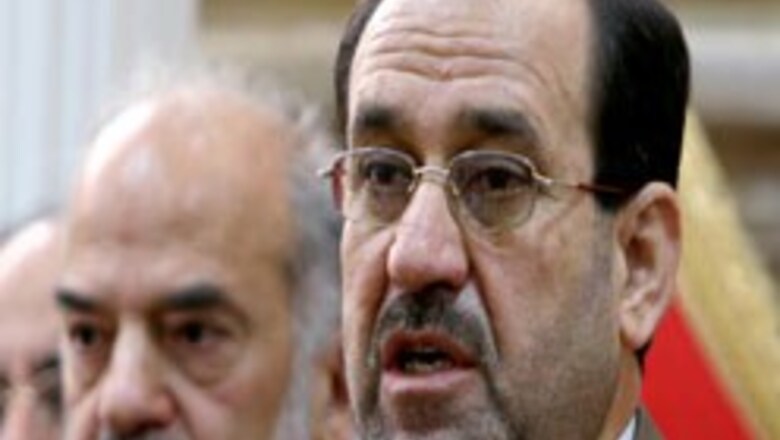
views
Baghdad (Iraq): The Shiite Muslim politician tapped as Iraq's prime minister said Monday that he thinks US troops could begin withdrawing in 18 months or less if his country's security forces get up to speed.
In an interview with CNN, Prime Minister-designate Jawad al-Maliki also promised to tackle the problem of militias, the armed groups thought to be fueling sectarian violence in the country.
Al-Maliki said the private forces that have held sway on the streets of Iraq must be disarmed.
The Shiite-led United Iraqi Alliance nominated al-Maliki, 55, for the prime minister post last week after the initial nominee, Ibrahim al-Jaafari, stepped aside amid opposition from Sunnis, Kurds and secularists who disliked his performance as transitional prime minister.
Al-Maliki was nominated on Saturday by President Jalal Talabani, longtime leader of the Patriotic Union of Kurdistan.
Al-Maliki is attempting to assemble a national unity government to present to parliament for its approval.
Under Saddam Hussein, the minority Sunni Muslims wielded power, often through violence against Shiites and Kurds.
In the current government, the Sunnis have a minority voice, and many officials think disaffected Sunnis largely fuel the insurgency.
During the interview, al-Maliki said, "Iraq must establish a nationwide reconciliation in the ethnically and religiously diverse country, torn by bloody, sectarian vendettas."
"I call on the Iraqis in all of their different factions and ethnic groups to go back to what they were like in Iraq, when the relationships were good between them and there was no prejudice based on their differences," he said, citing the many groups - including Arabs, Kurds, Turkmens, and Sunni Muslims, Shiite Muslims and Christians.
A Dawa Party official, al-Maliki has been a prominent player in the United Iraqi Alliance, the most powerful political bloc in the country.
PAGE_BREAK
He was involved in the drafting of a new constitution and de-Baathification efforts.
He escaped Hussein's regime and lived in exile for more than 20 years, mostly in Syria.
Optimism about Iraqi forces
In the interview, he spoke about a top concern for many Iraqis - the US-led military occupation in the country of 26 million people.
Al-Maliki says he believes it won't be long before Iraqi troops begin taking the reins from the US-led coalition.
Asked when the US troops would begin departing the country, al-Maliki said he had heard from the leadership of the multinational forces that they are expecting that to be in 18 months.
"I think that it will be less time than that because I am determined to provide the Iraqi forces with all of their needs."
Al-Maliki said he is optimistic about preparations in speeding the building of the security forces, not only to take over the security file [but] also to face the security challenges.
He added a much-repeated caveat: "The presence of the multinational forces is connected directly with our security forces' ability to provide security. If we don't have the security and military ability to provide security, the multinational troops will not be able to leave."
Al-Maliki: Job creation to steer manpower from militias
Al-Maliki said Iraqi society must be cleansed of terrorism, the government must be rid of administrative corruption and factional militias must be disarmed.
"We must also address the issue of government centrality and the centrality of the armed forces and that weapons must only be in the hands of the government and the people must be disarmed," he said.
PAGE_BREAK
He said that no militia in Iraq can share authority with the government's armed forces and cited the constitution, which states the dissolving of these militias into the security forces and to end their affiliation with the political parties they belong to.
Al-Maliki pointed to job creation strategies that would help steer manpower away from those groups.
"We would like to argue against all the arguments that will be put forth that militias are necessary to protect themselves and so on," said al-Maliki.
He also emphasized that the presence of these militias will add to the tension and the danger of a civil war.
Al-Sadr 'ready to participate'
The Mehdi Army of radical Shiite cleric Muqtada al-Sadr is among the militias on Baghdad streets raising concerns within the coalition, but al-Maliki insisted al-Sadr is ready to participate in the political process and its responsibilities.
"Mr Muqtada al-Sadr is a part of the political process, and he has representation in parliament and he is a part of this government," he said.
Regarding suspicions that the Shiite-led Interior Ministry has been linked to Shiite militias carrying out revenge acts against Sunnis, al-Maliki said that confidence can be restored if ministries "were administered by people who have no affiliation with militias.
He said the government will work on all of the concerns of Sunni Arabs, who have complained about unfair and brutal raids and detentions by Shiite police commandos in the Interior Ministry.
"If we can settle the case of militias and the ministers, there will be bridges of trust again, and we will work on all of the issues pointed out to us by our brothers, the Sunni Arabs," said al-Maliki, who has created bonds with Kurdish and Sunni politicians.




















Comments
0 comment